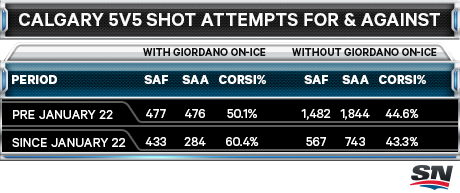As the NHL season trundles towards a conclusion, one thing is pretty clear: This has been a pretty awful season for the Canadian teams. Vancouver, considered by oddsmakers as Canada’s best Stanley Cup hope at the start of the campaign, is going to miss the playoffs. Edmonton was essentially eliminated 20 games in. The Jets have sacrificed another season to terrible goaltending. The Senators buried themselves with a 6-10-3 run in November and December from which there’s been no escape.
Montreal look to be headed to the playoffs but it seems likely to be a somewhat joyless appearance, with most expecting a reasonably quick and undignified exit at the hands of the Tampa Bay Lightning. Of course, it could be worse—13 days ago, the Maple Leafs were a point ahead of Montreal in the standings. Now, having suffered through a spectacular six-game collapse, the Leafs sit nine points back of the Habs and are unlikely to make the playoffs.
This leaves the Calgary Flames, who had the lowest expectations of any Canadian team entering this season. They have, by and large, accomplished about what was expected, although they look very likely to finish ahead of Edmonton. If you dig a little deeper though, the Flames have been enjoying an extended run of good play that’s been hidden by their start.
Starting with their game against Phoenix on Jan. 22, the Flames have gone 14-9-0 for 28 points, a 100-point pace. Fun comparison: another rebuilding team in Alberta, which shall remain nameless, hasn’t managed to post at least 28 points in 23 games since a December-January stretch in 2008-09, when it put up 29. What’s more, the Flames’ underlying numbers suggest that, while they’ve probably had a little bit of good fortune, there’s been some real improvement.
The most critical number associated with Calgary’s recent run of good results is an increased Corsi%. The Flames had a Corsi% of 45.8 percent prior to this stretch; since Jan. 22, they’ve posted a Corsi% of 49.3 percent. Their improvement with the score close—within a goal in the first two periods or tied in the third—has been even more dramatic, going from 44.4 percent prior to Jan. 22 to 49.9 percent since. Corsi% is favoured by hockey analysts because it tends to be very consistent over time. Sustained improvement in Corsi%, like that enjoyed by the Flames, tends to be real, a sign that a team has actually improved as opposed to simply riding a hot goalie or a stretch in which pucks are going in. A team that can post a 50 percent Corsi% has a solid foundation.
How has Calgary seen such an improvement? An awful lot of is tied up in some stunning numbers with the criminally underrated Mark Giordano on the ice.
Essentially, what’s happened is that Calgary has enjoyed a massive improvement when Giordano, who is generally paired with TJ Brodie, is on the ice. The Brodie-Giordano pairing can make a pretty fair case that it belongs amongst the NHL’s elite this season. They’re playing a lot of minutes and, despite toiling on a poor team, dominating those minutes.
Put like this, things seem a little different. It’s somewhat amusing that the Flames have received endless fawning praise from the national media for how hard they work relative to the Oilers and yet, when Giordano isn’t the ice, the Flames look to be pretty terrible, even during their recent 23-game stretch. It’s as if “hard work” is an just an easy explanation for something that commentators can’t explain. Or possibly, that the Flames only work hard when Giordano is on the ice. The former seems more likely.
The existence of a pairing like this in Calgary casts the Flames’ rebuild in a bit of a different light. They appear to have one of the most difficult things to find when rebuilding already in place—they’ve got a first-defence pairing that has produced elite results, even on a terrible team. It would be nice if Giordano was a few years younger, but it does make the job presented to whomever is tasked with managing the Flames a little easier.
Brian Burke has his weaknesses as a GM, but one of his strengths has been his belief in the importance of star forwards and his ability to identify them. If he can add some of those to Calgary in short order, the Flames might be competing for a playoff spot sooner than one might think. (Subject, of course, to Burke’s great weakness being his inability to find adequate goaltending).
Giordano’s been an underrated defender for some time, but the emergence of he and Brodie as a pair—along with Calgary’s stated aversion to tanking—sets up a pretty fascinating contrast between the Flames and the Oilers over the next few years. Calgary won’t add the level of prospect the Oilers did through the first two years of their rebuild—Monahan and whomever the Flames pick this year are unlikely to be on the level of Taylor Hall and Ryan Nugent-Hopkins—but Edmonton hasn’t had a defence pairing of the quality of Giordano-Brodie either.
If Calgary has a few forwards emerge or come in and excel and acquires some better goaltending, it’s possible to imagine the team competing for a playoff spot in the immediate future. It’s not much but, in this bleak endless winter, it’s about the closest thing Canadian NHL hockey has to a bright spot.
Unless you’re an Oilers fan.


